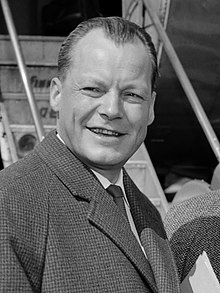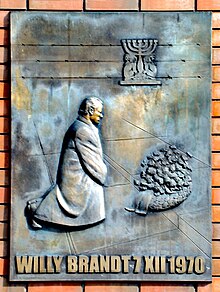Willy Brandt
In 1970, while visiting a memorial to the Warsaw Ghetto Uprising crushed by the Germans, Brandt unexpectedly knelt and meditated in silence, a moment remembered as the Kniefall von Warschau.
He lectured in Sweden on 1 December 1940 at Bommersvik College about problems experienced by the social democrats in Nazi Germany and the occupied countries at the start of the Second World War.
Sections of the "Stadtring" Bundesautobahn 100 inner city motorway were opened, while a major housing programme was carried out, with roughly 20,000 new dwellings built each year during his time in office.
[23] At the start of 1961, U.S. President John F. Kennedy saw Brandt as a figure destined for high office in West Germany and was hoping he would replace Konrad Adenauer as chancellor following elections later that year.
He also wrote Kennedy a highly critical public letter in which he warned that the development was liable "to arouse doubts about the ability of the three Allied Powers to react and their determination" and he called the situation "a state of accomplished extortion".
He was active in creating a degree of rapprochement with East Germany, and also in improving relations with the Soviet Union, Poland, Czechoslovakia, and other Eastern Bloc (communist) countries.
During a visit to a monument to the German occupation-era Warsaw Ghetto Uprising, he unexpectedly, and apparently spontaneously, knelt (Kniefall von Warschau), honoring the victims.
As the Minister of Foreign Affairs in Kiesinger's grand coalition cabinet, Brandt helped to gain further international approval for Western Germany, and he laid the foundation stones for his future Neue Ostpolitik.
This speech made Brandt, as well as the Social Democratic Party, popular among most of the students and other young West German baby-boomers who dreamed of a country that would be more open and more colorful than the frugal and still somewhat-authoritarian Bundesrepublik that had been built after World War II.
[45] From 1971, special subventions were provided to enable young farmers to quit farming "and facilitate their entry into the non-agricultural pension system by means of back payments".
Rehabilitation measures were also extended, child supplements were expressed as percentages of standard amounts and were thus indexed to their changes, and grandparents of recipients were exempted from potential liability to reimburse expenditure of social assistance carrier.
[50] The income limit for compulsory sickness insurance was indexed to changes in the wage level (1970)[50] and the right to medical cancer screening for 23.5 million people was introduced.
The government presided over an increase in the number of teachers,[36] generous public stipends were introduced for students to cover their living costs,[45] and West German universities were converted from elite schools into mass institutions.
[34] A much needed school and college construction program was carried out,[34] together with the introduction of postgraduate support for highly qualified graduates, providing them with the opportunity to earn their doctorates or undertake research studies.
[97] The determination of the income of families taken into consideration for housing allowances was simplified,[98] and increased levels of protection and support for low-income tenants and householders were introduced[34] which led to a drop in the number of eviction notices.
[101] Other reforms aimed at improving tenants' rights included protection against conversion of rental housing into condominiums, the prohibition of the misappropriation of living space, new regulation of the apartment broker system, and a fee scale for engineers and architects.
[104] In addition, Guidelines of December 1972 on the usage of federal funds in assisting social housing construction laid down that a certain standard needed to be observed when building homes for severely disabled persons.
[106] The "German Council for town development", which was set up by virtue of Article 89 of a law to foster urban building, was partly aimed at planning a favourable environment for families (such as the provision of playgrounds).
[71] In regards to civil rights, the Brandt Administration introduced a broad range of socially liberal reforms aimed at making West Germany a more open society.
The expense allowance for troops on duty-related absence from place of employment was improved, together with travel subsidies and provisions for military service damaged soldiers and their families.
[43] A ministerial order of January 1970 extended protection in cases of partial unemployment to home workers, while an ordinance of August 1970 fixed the conditions of health necessary for service in the merchant navy.
[35] The Industrial Relations Law (1972) and the Personnel Representation Act (1974) broadened the rights of employees in matters which immediately affected their places of work, while also improving the possibilities for codetermination on operations committees, together with access of trade unions to companies.
[146] In addition, the Severely Handicapped Persons Act of April 1974 extended the welfare and promotional obligations of the employer, and provided a right to extra holiday consisting of six working days.
[153] Under the Brandt Administration, West Germany attained a lower rate of inflation than in other industrialised countries at that time,[42] while a rise in the standard of living took place, helped by the floating and revaluation of the mark.
On 23 February 1972, SPD deputy Herbert Hupka, who was also leader of the Bund der Vertriebenen, joined the CDU in disagreement with Brandt's reconciliatory efforts towards the east.
Brandt's Ostpolitik as well as his reformist domestic policies were popular with parts of the young generation and he led the SPD to its best-ever federal election result in late 1972.
The spirit of reformist optimism was cut short by the 1973 oil crisis and the major public services strike 1974, which gave Germany's trade unions, led by Heinz Kluncker, a big wage increase but reduced Brandt's financial leeway for further reforms.
To counter any notions about being sympathetic to Communism or soft on left-wing extremists, Brandt implemented tough legislation that barred "radicals" from public service (Radikalenerlass).
One of Brandt's last public appearances was in flying to Baghdad, Iraq, to free Western hostages held by Saddam Hussein, following the Iraqi invasion of Kuwait in 1990.
Other works of the foundation include oversight of Brandt's papers, speeches and letters (the Berlin Edition), historical research as well as organizing lectures and international conferences.














